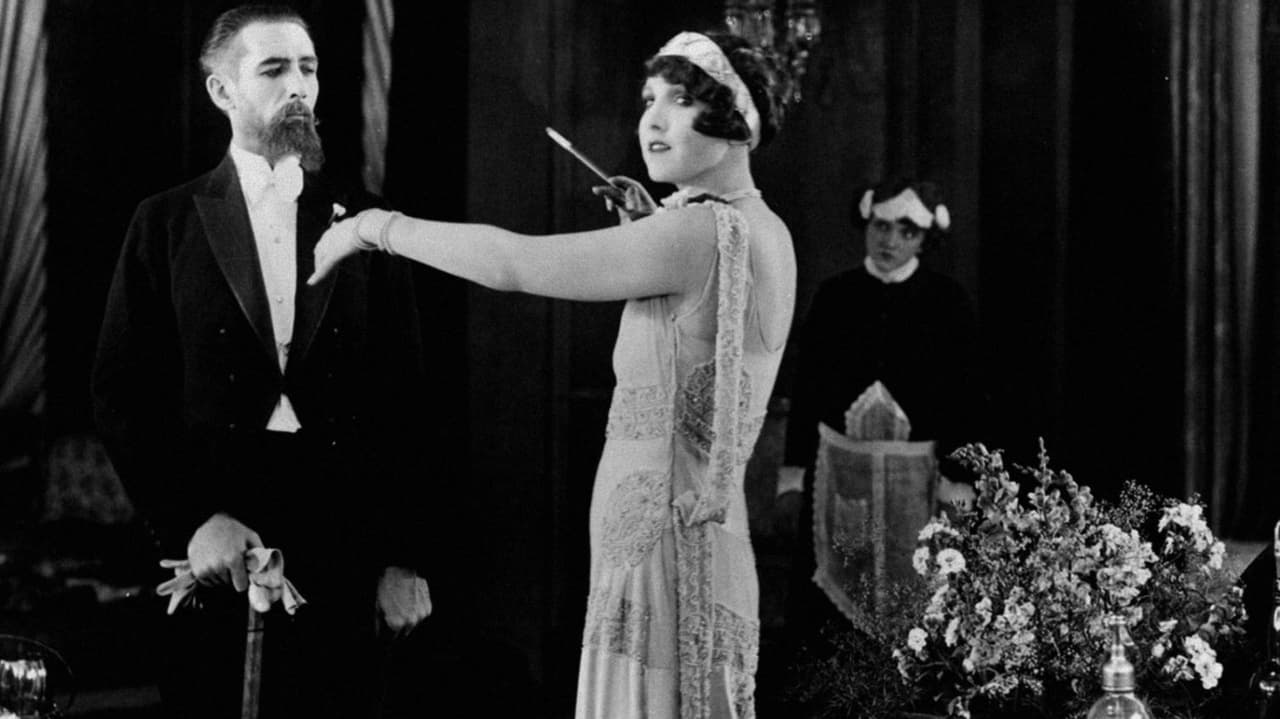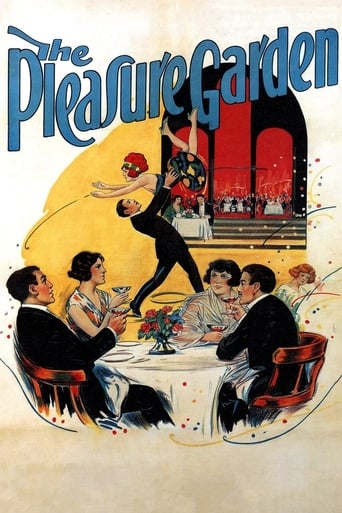

Although I seem to have had higher expectations than I thought, the movie is super entertaining.
... View MoreI enjoyed watching this film and would recommend other to give it a try , (as I am) but this movie, although enjoyable to watch due to the better than average acting fails to add anything new to its storyline that is all too familiar to these types of movies.
... View MoreI didn’t really have many expectations going into the movie (good or bad), but I actually really enjoyed it. I really liked the characters and the banter between them.
... View MoreThere's a more than satisfactory amount of boom-boom in the movie's trim running time.
... View More'Pleasure Garden' is Alfred Hitchcock's real firs movie as a director. He directed 'Number 13' before, but that shooting was shot down and the little of the footage he managed to shoot is now declared lost. 'The Pleasure Garden' is sweet little gem and is total pleasure to watch. It doesn't feel like Hitchcock's movie and there are very little his trademarks visible (how could there be, he was just beginner director). The story is very straightforward and simple melodrama, but it is not silly. Nothing is hidden under the surface. All the elements are well put together. Besides being Hitchcock's first movie as a director, there is nothing special, but it is a sweet film that definitely deserves to be seen. Especially by the fans of the legendary director.P.S. Alma Reville and Alfred Hitchcock got engaged during the shoot and what a couple they became.
... View MoreAt the age of 25, Alfred Hitchcock, who had been an assistant director to Michael Balcon, was given the chance to direct his first film, which was of course silent. It is very good and showed at once that he had talent. Assistant director on the film was a girl named Alma Reville, who was to become Hitchcock's wife and lifelong partner in all of his film projects. The film is based on a popular novel by 'Oliver Sandys', which was the pen name of a woman whose real name was Marguerite Jarvis, and who in this same year appeared as an actress under the name of Marguerite Evans in the comedy film STAGESTRUCK, with Gloria Swanson. The title of this film is the name of a music hall in London, where two girls are in the chorus together, and share a room in Brixton. The melodrama concerns the adventures of their lives and respective fates. The film was shot at Babelsburg Studios in Germany and had an international cast. The American actress Virginia Valli plays Patsy, the good girl of the two. And Jill, the girl who goes to the bad, is played by another American actress, Carmelita Geraghty. The German actor Karl Falkenberg plays the unpleasant and sinister Prince Ivan, who leads Jill astray. Falkenberg acted in 100 films between 1916 and 1936, after which he disappears from history. Probably he was Jewish, was banned from the screen by the Nazis, and then sent to a death camp. Possibly the best performance in the film is by British actor Miles Mander, who outdid Falkenberg by appearing in 107 films, between 1920 and 1947, including WUTHERING HEIGHTS (1939). In this film he plays a cad who married Patsy and then betrays her with a mistress and goes to pieces with drink and decadence. He delivers a very finely judged performance, and does not overact. Carmelita Geraghty is very convincing in her downward spiral into immorality, selfishness, and selling herself for fame and fortune. The film is not particularly creaky with age, and is well worth seeing.
... View MoreThis was Hitchcock's first ever film as director to be completed and it is indicative of his huge talent. Despite its age and therefore somewhat primitive production the young Hitch does a superb, professional and classy job. The film maintains interest throughout and is still funny, entertaining and impressive when viewed today! Hitchcock imbues it with directorial flourishes of brilliance with clever, interesting camera shots, intelligent storytelling and little bits of his psychological themes which strengthen all his films.In conclusion this is a superb film considering its age and the fact it is Hitchcock's debut.
... View MoreHitchcock's first film is fascinating in that him shows him leaping, almost fully formed, onto the screen with his lifelong themes and his jaundiced views present and shockingly incorrect. The Pleasure Garden tells the story of a chorus girl, Patsy, who gives the gift of friendship to a newcomer, a rube of a girl called Jill who gets herself robbed on her first visit to the theatre and who lacks a friend, contacts and a place to stay. Patsy gives her all of these.At first the film seems that it is going to be Jill's story, as we follow her hiring by the masher of an impresario and her quick elevation to the star of the lowbrow dance show the theatre is presenting. But it gradually becomes apparent that Patsy is the focus of the tale, as she is romanced by a friend of Jill's earnest fiancée Hugh, a rodent of a man called Levett. Levett and Patsy marry, whilst Hugh finds himself sidelined by Jill's new found stage-door-Johnny admirers. Levett and Hugh sail away to their overseas job in the colonies, leaving Patsy to pine for her husband and Jill to romance a roué Prince.Patsy and Levett's marriage is a curious thing. He asks her that they "share our loneliness together" before he sails back to his job, which she takes as a proposal of marriage (we get the impression he was after some temporary female company). Once back in the colonies, Levett shows his true colours, shacking up with a dusky native maiden and drinking like a soak. Patsy gets word that he's sick and decides to ship out to see him, but the fare isn't easy to raise; her now wealthy old friend Jill refuses to help her point blank, and only the cosy old couple who run the house where she boards save the day. Unfortunately for Patsy, the first thing she sees when she arrives at Levett's lodgings is her husband in his native maiden's arms. There follows a denouement of rather rancid melodrama, as Levett kills his mistress, is haunted by her ghost, almost kills Patsy, is killed himself by a deus ex machina colonial superior, leaving Patsy and Hugh free to realise that they love each other.Levett's cynical view of women (he quickly recognises Jill for what she is), his view of marriage as a mutual sharing of loneliness, his sexual obsession with his Other of a mistress, his murder of her when she puts his respectable life at risk and his haunting by the dusky temptress is a pretty lurid and provocative portrait of white middle-class masculinity soured by experience and conflicting desires. That he has to die for Hugh and Patsy to get together suggest that Hitchcock and his sources were up to the idea that respectable petit bourgeois marriage is built on the grave of all that it excludes long before the cultural and queer theorists were writing their stuff. Levett is a fascinating character, far richer and far more unknowable than the rather bland leads - the first in a long line of portraits of human oddity from The Maestro.The film's opening sequence, as Charles Barr points out in his introduction to the recent Region 2 Network release in their The British Years box-set, has a dirty old man sitting in the front row of a theatre looking through a lens at the bodies of the dancing girls - voyeurism, the male gaze, women subjected to it all ready to go in old Hitch's very first sequence in his début film.
... View More